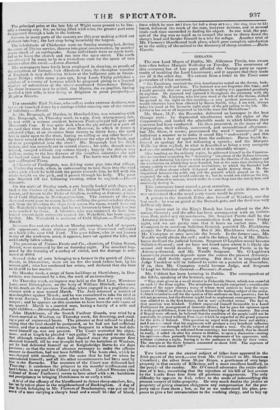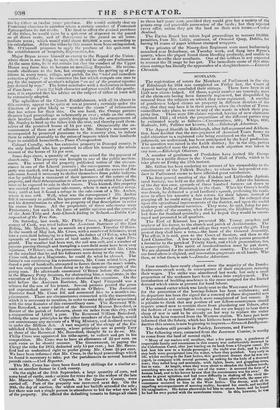Two letters' on the eternal subject of tithes have appeared
in the Irish papers of the week,—one from Mr. O'Connell to Mr. Sharma& Crawford ; the other from Major Bryan, a gentleman of very large property in that county of Kilkenny, and a most excellent landlord, to the peopl., of the county. Mr. O'Connell advocates the entire aboli- tion of ti hes; conceiving that the rejection of his bill of last session by the Lords frees him from all previous engagements. The only difficulty he appears to feel, refers to the mode of indemnifying the present owners of tithe-property. He very much doubts the justice or propriety of giving sinecure clergymen any compensation for the pro- perty taken from them ; but, as far as we understand his plan, pro- poses to give a fair remuneration to the working clergy, and to buy up the lay tithes ut twelve years' purchase. Ile Nvould entirely shut up Protestant churches in parishes where a certain number of Protestant Episcopalians du not reside. The fund to effect the gradual purchase of the tithes, he would raise by a quit-rent of sixpence in the pound Oil all direct rents, and of threepence in the pound on all inter- mediate rents; which would yield about 400,00W. a year, according to his calculation. After the tithes by this means have been extinguished, Mr. O'Connell proposes to apply the produce of his quit-rent to the establishment of hospitals, dispensaries, &c.
Major Bryan avows himself an enemy to the Repeal of the Union :
w i
here there s one King, he says, there aliould be only one Parliament.
At the same time, be is not certain but that the conduct of the Upper
House may force him to become an unw*" g Repealer. He recom- mends obedience to the law, but strongly urges the getting up of pe- titions in every town, village, and parish, for the "total and immediate extinction of tithes;" as he conceives the law which compels one man to pay for the support of unother's religion "an act if the greatest injustice fmr devised by man." The letter concludes with a declaration in favour of Poor-laws. Frtira the high character and great wealth of this gentle- man, it is expected that his advice on the subject of tithes at least will be extensively adopted.
The upholders of the Church Establishment, with all its abuses in this country, appear to be quite at sea at present ; certainly under the direction of no pilot likely to "weather the storm" of reformation that has arisen for their sins. On one hand, the Orange parsons threaten legal proceedings as vehemently as ever ; while on the other, their brother landlords are quietly dropping into the arrangements of Mr. Stanley to bind up the tithes with the rent, and thereby avail them- selves of the promised bonus of 15 per cent. Occasionally the an- nouncement of these acts of adhesion to Mr. Stanley's measure are accompanied by promised premiums to the tenantry also, to induce them to submit peaceably to the union of imposts which their landlords hope to establish henceforth.— Times Correspondent.
Colonel Conolly, who has extensive property in Donegal county, is the only landlord who has promised to allow his tenantry the whole amount of the bonus of 1.5 per cent.
Some days since, a quantity of sugar was seized for the payment of church-rate. The property was brought to one of the public auction. marts. The owner of the property published notice of the circum- stance in one of the Liberal journals' the consequence was, the pro- perty was marked, and no buyers could be found, and the owners of the sale-room found it necessary to shelter themselves from public indigna- tion by publishing a statement of their ignorance of the nature of the property, and their determination to allow no property seized for church. rates to be exposed to sale in their rooms. Thus hunted, this property was carried about to various sale-rooms, where it met a similar recep- tion; until at last it found a refuge in the sale-room of a Mr. Archer, where it was sold. Well, what was the consequence ? Mr. Archer felt it necessary to publish his ignorance of the nature of the property, and his determination to allow no property of that description to enter his rooms in future. All the proprietors of these sale-rooms were Protestants; but such is the force of public opinion and the strength of the Anti-Tithe and Anti-Church feeling in Ireland.—Dablin Cor- respondent of the True Sun.
On Saturday, last week, Mr. Philip Cross, a Magistrate of the county of Cork, was tried before the Assistant Barrister of the East Riding, Mr. Martley, for an assault on a peasant, Timothy O'Brien. In the month of May last, Mr. Cross, with a number of followers, went into a corn-field belonging to a farmer, the father of O'Brien, who held upwards of one hundred acres of land under Mr. Joseph Capel Fitz- gerald. The weather had been wet, the soil was soft, and a number of persons passing through and trampling a corn-field must have been very injurious. O'Brien's son, the prosecutor, remonstrated with Alr. Cross on the mischief that he and his followers were doing to the corn. Mr. Cross said, that as a Magistrate, he could do what he pleased. The farmer's son continuing his remonstrances, Mr. Cross seized him, pro- duced a pair of handcuffs, attempted to fasten them on the man's wrists, and was only prevented from doing so by the superior strength of the young man. He afterwards summoned O'Brien before the Justices at the Blarney Petty Sessions, for obstructing him, a magistrate, in the execution of his duty. The justices dismissed the summons. On the trial before the Assistant Barrister, Mr. Capel Fitzgerald was a witness for the son of his tenant. Several persons proved the gross and unprovoked nature of the assault on O'Brien. The Assistant Barrister fined Mr. Cross 10/. and sentenced him to a month's im- prisonment. There are circumstances connected. with the transaction, which it is necessary to mention, in order to make the public acquainted with the true features of this extraordinary case. The Reverend Wil- liam Beresford, a near relative of the Reverend Marcus Beresford, is Rector of the parish of Iniscarm, about six miles from this city, with a composition of 1,050/. a year. The Reverend William Beresford, holding the same principles as the other members of that family, would not countenance any measure of a Whig Ministry, and declined coming in under the Million Act. A vast majority of the clergy of the Es- tablished Church in this county, whose principles are as purely Tory as those of the Reverend Mr. Beresford, thought fit to do so. Mr. Philip Cross was appointed his tithe-agent, to collect and get in his composition. Mr. Cross was to have an allowance of 25 per cent, on such sums as he should recover. The Government, in paying the Clergy the tithe for 1833, deducted only 15 per cent. ; but Mr. Beres- ford had an undoubted right to prefer giving Mr. Cross 25 per cent. We have been informed that Mr. Cross, in the legal proceedings which he found it necessary to take, put the parishioners to several hundred pounds costs.— Cork Reporter.
This Mr. Cross has since been fined forty shillings for a similar as- sault on another farmer in Cork county.
On the night of the 18th September, a large quantity of corn, and some head of cattle, under seizure for rents due to the widow of the late Mr. Maurice Mahon, of Clopook, in the Queen's County, were carried off. Part of the property was recovered next day. On the 20th, the day of auction, the widow and her bailiffs attended the sale ; but there was not a single person in attendance to bid for what was left of the Property. She offered the defaulting tenants to forego all claim
to three half years' rent, provided they would give her a moiety of the potato crop and peaceable possession of the lands ; but they rejected every offer, unless they got the land on their own terms.—Carlow Sentinel.
The Excise Board has taken legal proceedings to recover 18,000/. penalties, from Mr. Liddy, stationer, of Ormond Quay, Dublin, for having 91 reams of paper without stamped wrappers.
Two privates of the Ninety-first Regiment were most barbarously assaulted near Bohorbuoy, on Tuesday week, and flung into Ryves's quarry, where the piquet found them bleeding profusely, and unable to move or describe their assailants. One of the soldiers is not expected to recover the ill usage he has got. The immediate scene of this atro- cious outrage has literally the appearance of a slaughterhouse.—Limerick Chronicle.



















 Previous page
Previous page